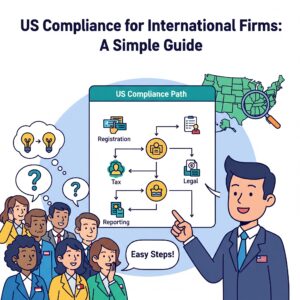Decoding US Regulatory Compliance: A Guide for International Companies (and How Outsourced Finance Can Help)
Entering the US market represents a significant opportunity for international companies. However, this expansion is often met with a complex web of federal, state, and local regulations. Navigating these compliance requirements – from tax laws and labor regulations to industry-specific rules – can be a daunting task. Failing to comply can lead to significant financial penalties, legal battles, and reputational damage. This article will break down common compliance pitfalls and explore how FinStrat Management’s outsourced finance services can provide the expertise and support necessary to ensure adherence, avoid costly penalties, and foster trust in the US market.
The Allure and the Challenge of the US Market
The United States remains a prime target for global expansion due to its large consumer market, innovative business environment, and robust economy. However, this attractive landscape is overlaid with a dense and often perplexing regulatory framework. Many international companies underestimate the complexities involved, leading to costly mistakes.
Common Regulatory Pitfalls for International Companies
Several key areas present significant compliance challenges for international businesses entering the US market. These include tax compliance, labor laws, industry-specific regulations, and data privacy regulations.
Tax Compliance: A Labyrinth of Laws
US tax law is notoriously complex. It comprises federal, state, and even local tax obligations. International companies must understand income tax, payroll tax, sales tax, and property tax implications. Furthermore, transfer pricing rules, which govern transactions between related entities, require careful planning and documentation to avoid scrutiny from the IRS.
 Federal Income Tax: Companies must accurately calculate and pay federal income tax on their US-sourced income. This involves understanding the corporate tax rate, deductions, and credits.
Federal Income Tax: Companies must accurately calculate and pay federal income tax on their US-sourced income. This involves understanding the corporate tax rate, deductions, and credits.- State Income Tax: Most states impose their own income tax, often with varying rules and rates. Companies operating in multiple states must determine their apportionment of income to each state.
- Payroll Tax: Employers are responsible for withholding and remitting federal and state payroll taxes, including Social Security, Medicare, and unemployment taxes.
- Sales Tax: Sales tax is levied at the state and local level on the sale of goods and services. Companies must determine which items are taxable, collect sales tax from customers, and remit it to the appropriate authorities.
Real-World Scenario: We worked with a European manufacturing company expanding into the US. They initially attempted to handle their US tax compliance using their existing European accounting team. They drastically underestimated the complexity of US state and local taxes. They faced significant penalties and interest charges due to late filings and incorrect tax calculations. FinStrat Management stepped in, implemented a comprehensive tax compliance strategy, and negotiated a penalty abatement with the IRS, saving the company a significant amount of money and bringing them into full compliance. This illustrates the critical need for specialized expertise.
Labor Laws: Protecting Employees and Employers
US labor laws are designed to protect employees’ rights and ensure fair treatment in the workplace. These laws cover a wide range of issues, including minimum wage, overtime pay, discrimination, harassment, and workplace safety.
- Fair Labor Standards Act (FLSA): Establishes minimum wage, overtime pay, and child labor standards.
- Equal Employment Opportunity (EEO) Laws: Prohibit discrimination based on race, color, religion, sex, national origin, age, disability, and genetic information.
- Occupational Safety and Health Act (OSHA): Ensures safe and healthful working conditions for employees.
- State Labor Laws: Many states have their own labor laws that provide additional protections for employees, such as paid sick leave and family leave.
Compliance with labor laws requires companies to develop and implement comprehensive HR policies, train employees on their rights and responsibilities, and maintain accurate records. Failure to comply can result in lawsuits, fines, and damage to the company’s reputation.
Practical Application: An Australian tech startup launched a US subsidiary, initially applying Australian employment contracts. They quickly faced legal challenges because their contracts lacked critical US-specific clauses regarding “at-will” employment and non-compete agreements. FinStrat Management, through its network of legal experts, advised them to revise their contracts to align with US labor laws, avoiding potential lawsuits and ensuring compliance.
Industry-Specific Regulations: A Tailored Approach
In addition to general regulations, many industries are subject to specific rules and requirements. For example, the healthcare industry is governed by HIPAA (Health Insurance Portability and Accountability Act), which protects the privacy of patient information. The financial services industry is subject to regulations from the SEC (Securities and Exchange Commission) and FINRA (Financial Industry Regulatory Authority). The food and drug industry is regulated by the FDA (Food and Drug Administration).
- Healthcare (HIPAA): Protects patient privacy and security of health information.
- Financial Services (SEC, FINRA): Regulates the securities industry and protects investors.
- Food and Drug (FDA): Ensures the safety and effectiveness of food and drugs.
- Environmental Regulations (EPA): Protects the environment and human health.
Companies must understand the specific regulations that apply to their industry and implement procedures to ensure compliance. This may involve obtaining licenses and permits, conducting regular audits, and training employees on compliance requirements.
Data Privacy Regulations: Protecting Personal Information
With the increasing importance of data privacy, companies must comply with regulations such as the California Consumer Privacy Act (CCPA) and the General Data Protection Regulation (GDPR) if they collect or process personal information of US residents, even if they aren’t physically located in California.
- CCPA (California Consumer Privacy Act): Gives California consumers rights over their personal information, including the right to access, delete, and opt-out of the sale of their data.
- GDPR (General Data Protection Regulation): Applies to companies that process personal data of EU residents, regardless of where the company is located.
Compliance with data privacy regulations requires companies to implement data security measures, provide notice to consumers about their data practices, and obtain consent for the collection and use of personal information. Failure to comply can result in significant fines and reputational damage.
How FinStrat Management Can Help
FinStrat Management offers a comprehensive suite of services designed to help international companies navigate the complexities of US regulatory compliance. Our venture assistance, outsourced finance, and network of subject matter experts provide the expertise and support needed to ensure adherence, avoid costly penalties, and foster trust in the US market.
Venture Assistance: Setting the Stage for Success
Our venture assistance services help international companies establish a solid foundation for their US operations. We provide guidance on entity selection, business registration, and initial compliance requirements. We help companies understand the legal and regulatory landscape and develop a comprehensive compliance plan.
- Entity Selection: Choosing the right legal structure (e.g., C-corporation, S-corporation, LLC) is crucial for tax and liability purposes. We help companies evaluate the pros and cons of each option and select the structure that best meets their needs.
- Business Registration: We assist with registering the business with the appropriate federal, state, and local authorities.
- Compliance Planning: We develop a comprehensive compliance plan that outlines the steps necessary to comply with all applicable regulations.
Example: A UK-based software company was unsure which legal entity structure was most advantageous for their US expansion. FinStrat Management conducted a thorough analysis, considering their long-term growth plans and tax implications. We recommended an S-corporation structure, which provided significant tax benefits in the early stages of their US operations.
Outsourced Finance: Expert Support for Ongoing Compliance
Our outsourced finance services provide ongoing support for tax compliance, financial reporting, and other critical functions. We act as an extension of your team, providing the expertise and resources needed to stay on top of changing regulations and ensure accurate and timely compliance.
- Tax Compliance: We prepare and file all necessary tax returns, ensuring compliance with federal, state, and local tax laws.
- Financial Reporting: We prepare accurate and timely financial reports, providing insights into your company’s financial performance and helping you make informed business decisions.
- Bookkeeping and Accounting: We handle all aspects of bookkeeping and accounting, from recording transactions to reconciling bank accounts.
- Payroll Processing: We process payroll accurately and efficiently, ensuring compliance with all applicable payroll tax laws.
Personal Anecdote: I recall a client, a Canadian e-commerce company, who initially tried to manage their US financials internally. They quickly became overwhelmed by the complexities of US GAAP (Generally Accepted Accounting Principles) and the constant changes in tax regulations. After engaging FinStrat Management, they were able to streamline their financial processes, improve their accuracy, and free up their internal team to focus on core business activities. They saw a significant improvement in their financial performance and a reduction in their compliance costs.
Network of Subject Matter Experts: Access to Specialized Knowledge
We have a network of subject matter experts in various fields, including law, HR, and industry-specific regulations. This allows us to provide comprehensive support for all your compliance needs. We can connect you with experts who can provide guidance on specific issues, such as labor law compliance, data privacy regulations, or industry-specific requirements.
- Legal Experts: Provide guidance on labor law, contract law, and other legal issues.
- HR Consultants: Assist with developing HR policies and procedures that comply with US labor laws.
- Industry-Specific Experts: Provide guidance on regulations specific to your industry, such as healthcare, financial services, or food and drug.
Practical Example: A German medical device company needed assistance with navigating FDA regulations for their US product launch. FinStrat Management connected them with a regulatory expert who guided them through the approval process, ensuring compliance and accelerating their time to market.
Building Trust and Fostering Long-Term Success
Compliance is not just about avoiding penalties; it’s about building trust with customers, employees, and stakeholders. By demonstrating a commitment to compliance, companies can enhance their reputation, attract and retain talent, and build strong relationships with business partners. FinStrat Management helps international companies build a strong foundation of compliance, fostering long-term success in the US market.
Navigating US Compliance with Confidence
The US regulatory landscape can be challenging for international companies, but with the right support, it is possible to navigate these complexities and achieve success. FinStrat Management’s venture assistance, outsourced finance, and network of subject matter experts provide the expertise and resources needed to ensure compliance, avoid costly penalties, and build trust in the US market. By partnering with us, international companies can focus on growing their business with confidence, knowing that their compliance needs are being handled by experienced professionals.


